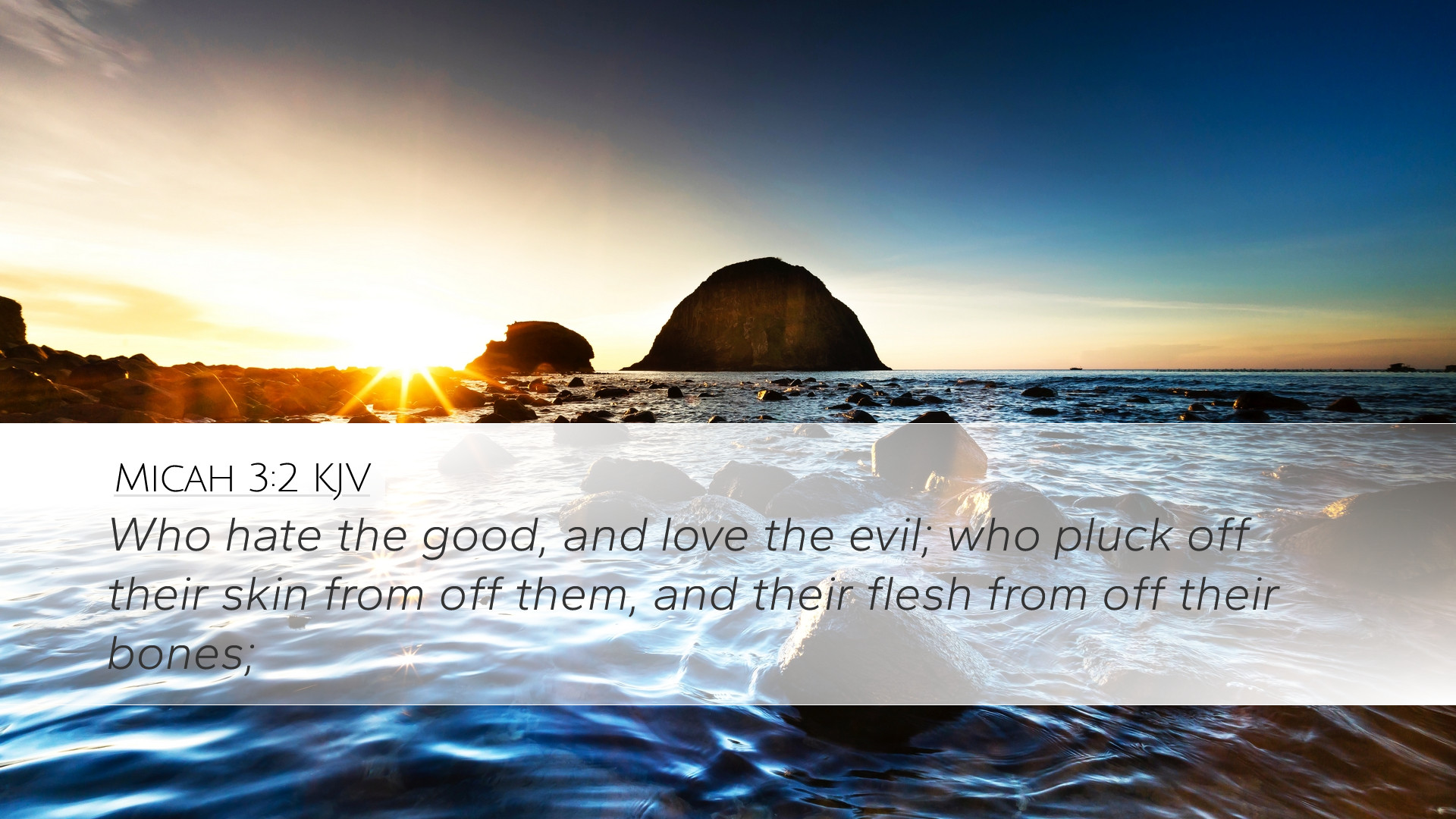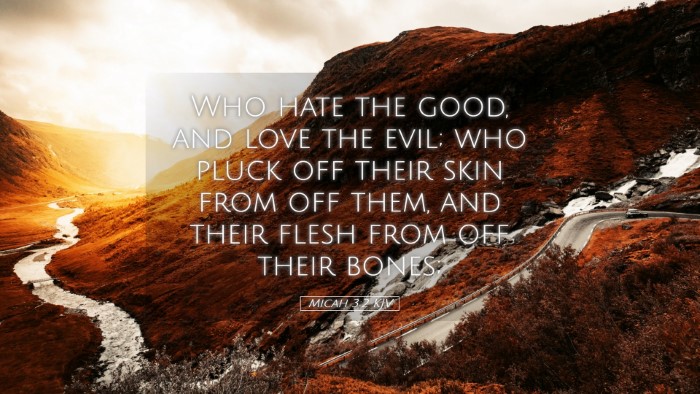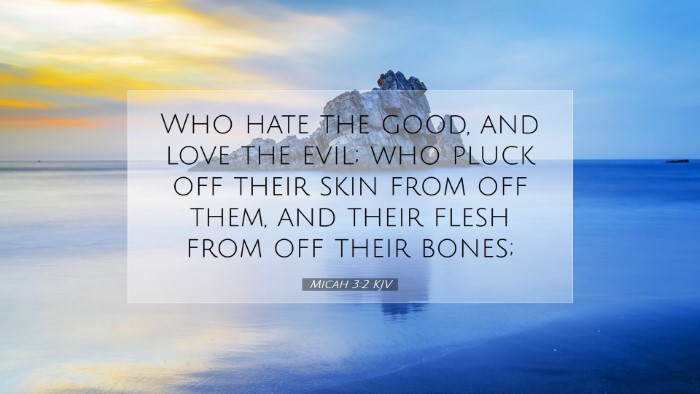Old Testament
Genesis Exodus Leviticus Numbers Deuteronomy Joshua Judges Ruth 1 Samuel 2 Samuel 1 Kings 2 Kings 1 Chronicles 2 Chronicles Ezra Nehemiah Esther Job Psalms Proverbs Ecclesiastes Song of Solomon Isaiah Jeremiah Lamentations Ezekiel Daniel Hosea Joel Amos Obadiah Jonah Micah Nahum Habakkuk Zephaniah Haggai Zechariah MalachiMicah 3:2
Micah 3:2 KJV
Who hate the good, and love the evil; who pluck off their skin from off them, and their flesh from off their bones;
Micah 3:2 Bible Commentary
Commentary on Micah 3:2
Micah 3:2 (NIV): "You who hate good and love evil; who tear the skin from my people and the flesh from their bones."
Introduction
The verse from Micah 3:2 presents a somber indictment of the leaders of Israel. This portion of Scripture occurs in a context where the prophet Micah is addressing the unjust practices of those in power, emphasizing their moral failures and the consequent social injustices being propagated in society. The heartfelt and forthright proclamations of Micah serve as both a warning and a call to repentance.
Historical Context
The book of Micah is situated during the 8th century BCE, amid a time of political instability and moral decay in Israel. Micah's ministry coincided with other prophets like Isaiah, and they both confronted the issues of social injustice and corruption within society. The mention of the leaders in this verse signifies a broader critique of the ruling class, who are often seen as defenders of justice yet are depicted as perpetuators of evil.
Exegesis of Micah 3:2
This verse encapsulates a clear dichotomy between righteousness and wickedness. Micah opens by stating that certain individuals, likely the leaders and influential figures of the nation, possess a complete reversal of moral values; they "hate good" while "love evil." This rhetorical contrast highlights their rejection of divine justice and embrace of nefarious practices.
The phrase "who tear the skin from my people and the flesh from their bones" employs vivid, graphic imagery to characterize the severity of the exploitation and oppression inflicted upon the populace. The metaphor speaks to the violence and cruelty exercised by these leaders, indicating that they are not just indifferent to suffering but are actively causing harm to the most vulnerable in society.
Thematic Implications
- The Nature of Evil:
The verse directly presents the nature of evil as a willful turning away from good. This moral failure is not merely an accident but a conscious choice, indicative of a heart hardened against truth.
- Social Responsibility:
Micah’s critique of leadership extends to societal responsibilities, suggesting that those in positions of power must promote justice and protection for the marginalized rather than exploitation.
- Divine Justice:
This condemnation underlines the eventual judgment that will come upon leaders who fail in their duty. Micah's prophecy invites reflection among those who hold positions of authority in both church and society.
Insights from Public Domain Commentaries
Matthew Henry
Henry draws attention to the abhorrence of evil and the tragic consequences of a society led by corrupt individuals. He notes that the leaders of Israel have misused their authority, and thus, their systematic misconduct invites divine retribution. This commentary serves as a reminder to church leaders about their sacred charge to uphold righteousness.
Albert Barnes
Barnes elaborates on the severity of the leaders’ offences, equating their actions to cannibalism in a metaphorical sense where they consume the very people they are meant to protect. He emphasizes that this cruel metaphor illustrates the ultimate betrayal of trust by those in authority, making the passage applicable for contemporary leaders who deviate from their moral obligations.
Adam Clarke
Clarke focuses on the prophetic call for justice and righteousness, critiquing the status quo. He advocates for the need to confront injustices boldly, warning that God sees and knows the actions of those who have strayed from ethical leadership. Clarke suggests that the church must act as a prophetic voice in today’s context, highlighting the importance of integrity in leadership to those who shepherd congregations.
Practical Applications
- Leaders' Accountability:
Modern church and community leaders must reflect on their roles. This verse compels leaders to assess their actions against their ethical responsibilities and the welfare of their congregations and communities.
- Promoting Justice:
It is crucial for churches to have a strong stance on social justice issues. Micah’s words challenge not just leaders but all believers to advocate for the oppressed and stand against evil.
- Personal Reflection:
Every believer should be encouraged to reflect on their personal choices and attitudes towards good and evil, understanding that the heart's alignment with God's righteousness is vital for individual spiritual growth.
Conclusion
Micah 3:2 serves as a solemn reminder of the grave responsibilities borne by leaders, both in ancient Israel and in contemporary society. The powerful imagery used by the prophet continues to resonate, inviting leaders and followers alike to a deeper understanding of moral and ethical dimensions of their faith. The call to love good and hate evil remains as pertinent today as it was in Micah's time, urging the church to uphold truth, justice, and integrity in all fronts.


